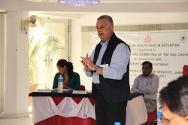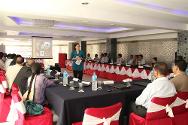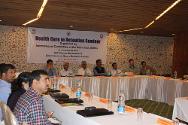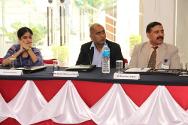India: Medics and prison authorities discuss health care for those in detention
25-11-2013 Interview
Monitoring the health conditions of detainees is a priority for the ICRC. During a recent visit to India, Dr Raed Abu Rabi, head of the ICRC's Health in Detention Unit, led seminars in Jammu and Srinagar on global standards of health care in places of detention.
Why do you think it is important to tackle issues of health care in detention in the work the ICRC does all around the world?
Health care in detention is poorly defined, poorly classified and poorly understood in most countries. There is lack of specialized education or training on the subject, lack of motivation and, in some cases, even social stigma attached to working in prisons.
Over-crowding in prisons, poor hygiene conditions and communicable diseases are on the increase, such that prisons become a breeding ground for all manner of related problems. It is a sad reality that where budget cuts affect prisons, health is the first casualty.
It is imperative that we address these issues in order to alleviate issues related to health care in detention.
Where do you see the ICRC’s added value to prison authorities?
Where we do have concrete political commitment from the authorities to improve the health condition of detainees, the outcome is very visible. We have had great success in Colombia, Lebanon and Azerbaijan not only because of ICRC involvement, but also because the authorities have taken a decision to improve conditions in prisons.
National authorities want the experience that the ICRC brings because we have tackled issues of access to health care for detainees, equal to that available to people outside. We are running mental health programmes, anti-cholera and anti-malaria programmes and so on in prisons, in conjunction with the authorities.
How does your seminar deal with the dilemma that prison doctors face on a daily basis, for example security constraints versus medical needs?
Balancing health care and security in prisons is a very delicate and complicated issue. Ideally, health must respect security and security must have respect for medical ethics. But this isn’t always the case because doctors look at sick detainees as patients first, while authorities consider sick patients as detainees first.
For detainees, health is a right. It is not a gift you are giving them. In most countries, prison doctors are under the supervision of security officials. To tackle this issue, we are calling for action in one of two ways: to assure the independence of medical doctors or to establish independent health units. That said, huge changes and progress are being made around the world, not just because of the ICRC but also because of the initiatives being taken by authorities.
What do you see as the specific role of medical doctors compared to that of the prison authorities in improving overall health care conditions for detainees?
Medical doctors working in prisons have to base their interventions strictly on medical ethics – showing respect for the prisoner as a patient first and a detainee second, showing no discrimination, maintaining respect for prison rules, - at the same time being free to express medical opinion, and above all caring for the well-being of the patient.
Doctors need to be trained and motivated, and given examples of achieving efficient health care with little means. The ICRC has many such examples to share. We have taken doctors to other countries to see best practices and to help replicate them in their own country. But this depends as much on the political will of the authorities as it does on the ICRC.
How does culture play a role in the way health issues are tackled in places of detention, especially where female prisoners are concerned?
Today, only 9% of prisoners across the world are female. Prison is largely a man’s world. There is not much awareness about gender issues in places of detention.
While religion and culture must be respected, they need to take into account the well-being of detainees. We prefer recommend to have female guards and female doctors for female detainees. This is something we always discuss with prison authorities.
The ICRC considers those 9% of detainees as part of a vulnerable group and hence we maintain a special focus on them. But there is a lot more than can be done in this aspect.
Can you tell us something about your recent mission to India?
In India, I conducted two seminars on the issue of health care in detention, one in Jammu and the other in Srinagar. Participants included staff from Directorate of Health Services, police superintendents, chief medical officers, prison doctors and people from the Indian Medical Association. The idea was to provide them with a basic understanding of health care in detention from an international perspective, where the ICRC has a worldwide lead. Both seminars attracted some 40 participants. As well as discussing international standards of health care in detention, we looked at the best ways to improve the living conditions of detainees, without discrimination of any nature.
I found the knowledge and understanding of some of the medical officers to be remarkable and much better than I have seen in other parts of the world. All they need now is more training to boost their capacity and motivation.
The positive collaboration of and attendance by health professionals and prison authorities indicated to me that they were looking forward to the seminars and their outcomes. We will continue to work with the Indian health care and prison authorities in finding the best ways to implement the recommendations jointly identified during the seminars.
The seminars were the first of their kind to be held in India in the 17 years since the ICRC began its work there for detainees.



